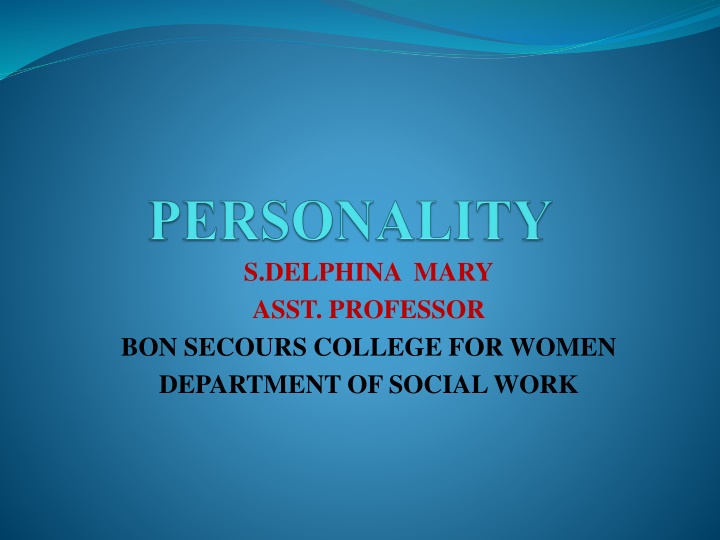
Understanding Personality: Theories and Concepts Explored
Explore the meaning, definition, and various theories of personality including Trait Theory, Allport's Traits, Cattell's Traits, and Type Theory. Delve into the essence of personality and its significance in shaping individual behavior and characteristics.
Download Presentation

Please find below an Image/Link to download the presentation.
The content on the website is provided AS IS for your information and personal use only. It may not be sold, licensed, or shared on other websites without obtaining consent from the author. If you encounter any issues during the download, it is possible that the publisher has removed the file from their server.
You are allowed to download the files provided on this website for personal or commercial use, subject to the condition that they are used lawfully. All files are the property of their respective owners.
The content on the website is provided AS IS for your information and personal use only. It may not be sold, licensed, or shared on other websites without obtaining consent from the author.
E N D
Presentation Transcript
S.DELPHINA MARY ASST. PROFESSOR BON SECOURS COLLEGE FOR WOMEN DEPARTMENT OF SOCIAL WORK
MEANING: Personality is the total quality of an individual behavior as it is shown in his/her habits, thinking, attitudes, interests, his/her manner of thinking, attitudes, interests, his/her manner of acting and his/her personal philosophy acting and his/her personal philosophy of life. It is the totality of his/her being. It includes his physical, mental, emotional and temperamental make-up and how it shows itself in behavior. his/her habits,
DEFINITION: Macionis Macionis define as It is the constant pattern of thinking, feeling and acting. Ogburn Ogburn and Nimkoff sentiments, attitudes, idea, habits, skills and behaviors of an individual. Nimkoff define it as the totality of
THEORIES OF PERSONALITY: TRAIT TRAIT THEORY THEORY FREUD FREUD THEORY THEORY JUNG JUNG THEORY THEORY ADLER ADLER THEORY THEORY MASLOW MASLOW THEORY THEORY ERICKSON ERICKSON THEORY THEORY 1.Ernest 1.Ernest TYPE TYPE THEORY: THEORY: 2.Sheldon 2.Sheldon
TRAIT THEORY: Traits are tendency to behave in relatively consistent and distinctive ways across situations. These are the measurable aspects of personality. For example : Friendliness, Honesty, Social Etc It includes ALLPORT and CATELL theories.
ALLPORT TRAIT ALLPORT TRAIT He Identified Three Traits: Cardinal Traits(individual behaviours) Central Traits(It Describe A Person.Eg:honesty) Secondary Traits(small Range Of Traits And Not Strong) 1. 2. 3.
RB CATELL TRAITS: Source Traits(sources That Determine Our Behaviour) Surface Traits(manifested In Our Behaviour)
TYPE THEORY: 1.ERNEST 1.ERNEST KRETSCHMAN S KRETSCHMAN S THEORY THEORY 2.WILLIAM 2.WILLIAM SHELDON THEORY SHELDON THEORY
1.Ernest Kretschmers Theory Ernest Is A German Psychologist He Found That Certain Body Types Are Associated With Particular Types Of Mental Disorders. He Classified Personalities Into three Types
A) Pyknic Type: Short and round body Extraverts May have MDP(Manic Depressive psychosis)
B) Asthenic Type: Slender or slim body Introverts May be suffer from Schizoprenia.
C) Athletic Type: Strong body More energetic and aggressive(ambiverts) May be prone to suffer from MDP
2.William Sheldons Theory He Correlating Temperament And Body Type. He Has Divided People Into Three Types.
ENDOMORPH(pyknic type) They are sociable and relaxed ECTOMORPH(asthenic type) They are shy , reserved , self-conscious MESOMORPH(athletic type) They are physically active , noisy , adventurous
1 2 3
1 2 3
JUNG THEORY: EXTROVERT INTROVERT AMBIVERT
1 2 3
FREUDS THEORY: Id Pleasure Principle Unconscious Mind Ego Reality Principle Sub-conscious Mind Superego Conscience Principle Conscious Mind
FREUDS PSYCHO SEXUAL DEVELOPMENT: 0 -1 (mouth sucking) Weaning(from breast or bottle) Oral 2-3(anus-expelling or retaining feces) Toilet training Anal 4-5(genitals-masturbating) Identifying adult role models Phallic
Continued... 6-12(sexually repressed) Expanding social contacts Latency Puberty onwards(being sexually intimate) Establish intimate relations Genital
ERICKSON THEORY: PERIOD OF TIME PERIOD OF TIME VIRTUE VIRTUE CONFLICTS CONFLICTS Infancy Hope Basic Trust Vs Mistrust Years 1 - 3 Will Autonomy Vs Shame Or Doubt Years 3 - 5 Purpose Initiative Vs Guilt Years 5 - 12 Competence Inferiority Adolescence Fidelity being True To The Self Identity Vs Role Confusion Early Adulthood Love Intimacy Vs Isolation Middle Adulthood Care Generatively Vs Stagnation Late Adulthood Wisdom Ego Integrity Vs Despair
MASLOW THEORY: SELF ACTUALISATION SELF ESTEEM NEEDS SOCIAL NEEDS SAFETY NEEDS PHYSIOLOGICAL NEEDS
FACTORS INFLUENCING PERSONALITY: Biological Factors Environmental Factors
BIOLOGICAL FACTORS HEREDITY HEREDITY ENDOCRINE ENDOCRINE GLANDS GLANDS PHYSIQUE PHYSIQUE NERVOUS NERVOUS SYSTEM SYSTEM
ENVIRONMENTAL FACTORS: FAMILY TEACHER BIRTH ORDER PEER GROUP SCHOOL CULTURE MASS MEDIA SIBLINGS




